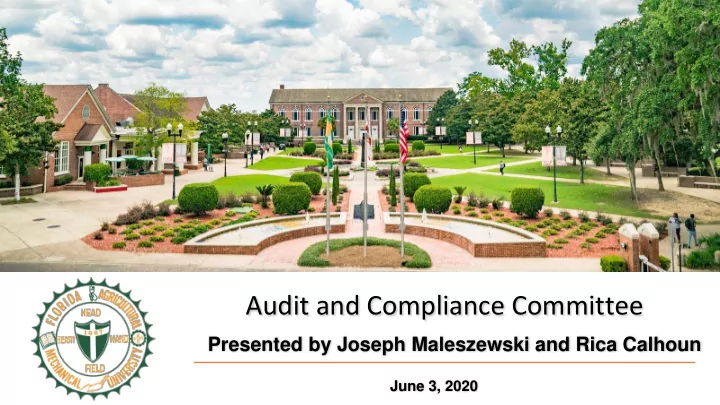

Audit and Compliance Committee Presented by Joseph Maleszewski and Rica Calhoun June 3, 2020
Risk Assessment June 2019 - May 2020 Jos oseph eph Ma Males eszew zewski, ski, MB MBA, , CIA, , CIG, G, CIGI GI, , CIGA GA, , CISA SA, , CGA GAP, P, CCEP Vi Vice e Pr Pres esident dent of of Audi dit Division vision of of Audit
Risk Assessment • Requirements • Process o Interviews o Focus Groups o Industry Research o Audit, Advisory, Investigations • Timeline • COVID-19 • Heat Map
Risk Assessment 1. Safeguarding the health and safety of students, faculty, and staff 2. Ensuring continuity of courses of study and other essential operations 3. Determining the short- and long-term financial implications 4. Providing timely communications with key constituencies 5. Addressing special considerations such as clinical and research program continuity, food and housing insecurity, and the needs of low-income and international students
COVID-19 Risk Areas External Distance Learning Compliance Funding Health & Safety Advancement Auxiliaries Enrollment Research Construction Human Student Wellness Budget Resources Controller’s Emergency Procurement Preparedness Services Office Information Athletics Legal Technology
Risk Assessment Academic Affairs: Distance Learning Students without the proper technology Many courses that were structured for for course completion may increase in-person instruction, posed challenges course failure rates, withdrawals, and for quick conversion to a virtual setting impact progression rates Scaling of academic integrity Quality instruction will be hampered by technology and processes for volume 50% of the faculty being new to of Distance Learning distance learning instruction and/or instructional technology Grading policy changes may impact Change of procedures to ensure Performance Based Funding metric compliance with privacy laws in a outcomes remote environment Increased need for academic support Manual graduation processes that were services in a virtual environment automated or need to be automated
Risk Assessment Finance & Administration: Information Technology Lack of employee knowledge on how Lack of sufficient levels of ongoing to appropriately use and secure cybersecurity awareness technology provided for teleworking communications to reinforce the need and distance learning for remote workers/students to remain vigilant to socially engineered attacks Capability to ensure that all remote Increased occurrence of phishing, access capabilities are tested and secure malware, and ransomware attacks since and endpoints used by workers are the COVID-19 pandemic began patched Ability of current staffing levels to Strain of teleworking and distance meet the security monitoring and learning technology on University customer service within an expanded resources (people, costs of operating environment software/hardware/licenses) Vulnerability management of remote Insecure virtual communication access tools or infrastructure (i.e. VPN) platforms impacting University operations, privacy requirements, and reputation
Risk Assessment Finance & Administration: Budget Ability to balance the FY 2019-2020 Ability to accurately forecast budget budget due to significant unplanned scenarios due to limited expense expenses related to COVID-19, information: operational expenses to including refunds of housing and meal prepare and sustain a new mode of plans operations Ability to accurately forecast budget scenarios due to limited revenue information: state appropriations, enrollment, fall auxiliary, etc.
Risk Assessment Student Affairs: Student Wellness Increased prevalence of mental health Ability to virtualize recreation and needs and alcohol and drug issues fitness activities Proliferation of electronic and manual Ability to monitor for and detect hazing student data requiring protection within Greek life and student activities Ability to provide additional resources Coordinating and facilitating to students to higher risk populations communication amongst departments (FTIC, international students, and schools of complaints or issues significant financial need) when in a remote work environment Implementation of appropriate safety measures to comply with physical distancing guidelines
Heat Map
Risk Assessment
Work Plan July 2020 – December 2020 Jos oseph eph Ma Males eszew zewski, ski, MB MBA, , CIA, , CIG, G, CIGI GI, , CIGA GA, , CISA SA, , CGA GAP, P, CCEP Vi Vice e Pr Pres esident dent of of Audi dit Division vision of of Audit
Work Plan Overview Requirement • IIA Standards – Performance Standards 2010 Planning Changes to Work Plan • 6 – Month Audit Work Plan • Mapped to Strategic Plan and President’s Goals Benefit of New Format • Responsive to rapidly changing risks • Focus on accountability, integrity, and efficiency
Assurance Services CARES Act Funding Reviews Knight Foundation - SJGC • Emergency Student Expenditure Reviews • Q4 ( April 2020 – June 2020) Financial Aid • Institutional Funds • Q1 ( July 2020 – Sept 2020) • HBCU Funds Reimbursements Auxiliary Transfers Review Spring 2020 Housing and Auxiliary to Athletics January 2020 – June 2020 Meal Plan Performance Based Funding Data Integrity Audit
Advisory Services Strategic Financial Management Athletics Budget Process • Performance Based Funding • Budget Process Compliance • CARES Act – HBCU Funding • Revenue Forecasting • Process for Compiling Expenses • Budget Monitoring and IT- Remote Working • Security Controls Reporting • Budgeting for Future Capital • Operational Impacts Outlay and Maintenance Costs Management Requests • Title IX • Board of Trustees • Senior Leadership Team • External Party
Continuous Monitoring Services Purchase Cards Construction • Unallowable Expenses • Root Cause Analysis: • Data Trend Analysis Project Delays • Reconciliation Compliance • Root Cause Analysis: Budget Shortfalls • Funding Source Allowability for Expense • CASS Relocation Plans • Budget Reporting Textbook Affordability • Fall 2020 • Spring 2021
Audit and Advisory Services on the Horizon Assurance Services Academic Honesty Framework Property Management Review Colleges/Schools – Academic and Business Operations Payroll – OPS, Cost Center Online Education and Support Advisory Services Student Wellness Infrastructure FEMA – Expense Tracking and Reimbursement Privacy – Governance, Processes, Training Housing- Business Operations & Student Safety Continuous Monitoring Services IT-NIST 800-171/Cybersecurity Maturity Model Certification COSO – Enterprise Risk Management Implementation
“At FAMU, Great Things are Happening Every Day!”
Recommend
More recommend